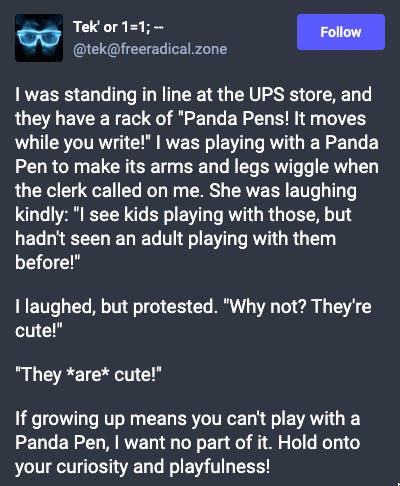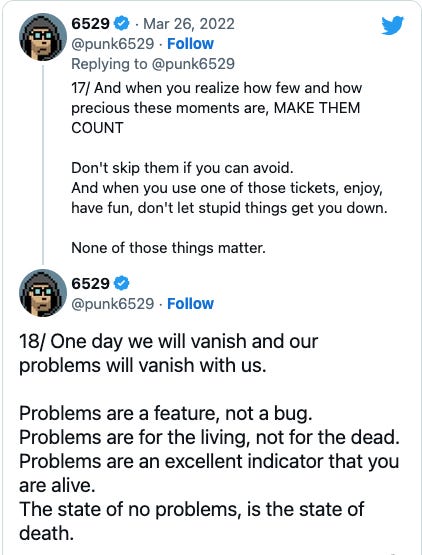🦸 Inneresting #145 - Heroic responsibilities
You don't need another take on Spider-Man's origin story to know what comes with great power.
When a child first catches adults out — when it first walks into his grave little head that adults do not always have divine intelligence, that their judgments are not always wise, their thinking true, their sentences just — his world falls into panic desolation. The gods are fallen and all safety gone. And there is one sure thing about the fall of gods: they do not fall a little; they crash and shatter or sink deeply into green muck. It is a tedious job to build them up again; they never quite shine. And the child’s world is never quite whole again. It is an aching kind of growing.
– John Steinbeck, East of Eden
The hero of a story is often synonymous with the protagonist. But heroes are also symbols, leaders, and aspirational figures — for better or worse.
Brett Williams considers the fandoms surrounding Elon Musk and David Foster Wallace as examples of toxic deification. Looking at a recent fictional example, Liz Young shows the connections between the working conditions in The Menu’s restaurant Hawthorne to the characteristics of a cult. OneTake hones in on how The Menu examines the cult of personality that builds around chefs and content creators, and how those parasocial bonds lead to self-destructive behaviors.
If the culture around a heroic figure exists to prop that figure up, it can lead to us-versus-them fanaticism. How can leaders inspire without inflaming?
Linda A. Hill breaks down the concept of “leading from behind,” drawing on Nelson Mandela’s analogy of a shepherd who allows their flock to walk ahead, but maintaining enough authority to keep everyone moving together. Gary S. Schwartz applies a similar lens to Ted Lasso’s leadership style: It’s not about demanding the attention and adulation of others, but working to find what’s praiseworthy in each member of the team.
Because sometimes the most heroic act is inspiring heroic action in others. Case in point:
Leon Miller breaks down the issue of All-Star Superman this page comes from, focusing on the importance of choosing not to show Superman swooping in to catch a suicide in progress, but instead offer a moment of reassurance to convince a person to save themselves. John Trafton returns to Richard Donner’s Superman to explore how it used allusions to cinema’s past in order to re-establish the possibility of an altruistic hero at a time of disillusionment with institutions and powerful figures.
And if you’d like some data to back up the idea of fictional heroes having an impact on real people, The Geena Davis Institute on Gender in Media shares research on “The Scully Effect,” where women who were fans of Dana Scully from The X-Files were more likely to pursue STEM careers.
Be your own hero - Join the Write Sprint!
Don’t worry about the writing habits of so-and-so, the famous, prolific genius. Join us in our weekly Write Sprint thread to meet your Substack neighbors and build your own habits!
FYI: You no longer need to use the Substack app to participate in chat! The Write Sprint thread will now open in any browser and allow subscribers to join in.
What’s a Write Sprint?
John wrote up an explanation, but here’s the short version: Set a timer for 60 minutes, close down all distractions, and do nothing but write until that timer goes off.
Shout out to last week’s Sprinters Heather Kennedy, Vicki Bawcombe, Brian Matusz, John Harvey, and Idalmiz!
Are you new here?
Inneresting is a weekly newsletter about writing and things that are interesting to writers. Subscribe now to get more Inneresting things sent to your inbox.
Previously on Inneresting…
In case you missed it, in last issue’s most clicked link Keely Hill creates a pair of axes to show that episodic vs. serialized storytelling isn’t a binary, but a spectrum.
Other Inneresting Things…
David Barsalou links the original comic panels to their appearance in Roy Lichtenstein’s art to credit the original artists.
Carrie Battan explains what it’s like to turn to Reddit as both an answer to the collapse of Twitter and the degradation of Google’s search results.
In Takaharu, two grandparents built a statue of Totoro and dressed the space like the iconic bus stop scene, complete with red umbrella.
Matt Birchler weighs in on the value of owning permanent copies of the media you cherish, and the problem of streaming media that never gets a physical release.
Reading the room



And that’s what’s inneresting this week!
Inneresting is edited by Chris Csont, with contributions from readers like you and the entire Quote-Unquote team.
Are you enjoying this newsletter?
📧 Forward it to a friend and suggest they check it out.
🔗 Share a link to this post on social media.
🗣 Have ideas for future topics (or just want to say hello)? Reach out to Chris via email at inneresting@johnaugust.com, Twitter @ccsont, or Mastodon @ccsont@mastodon.art






